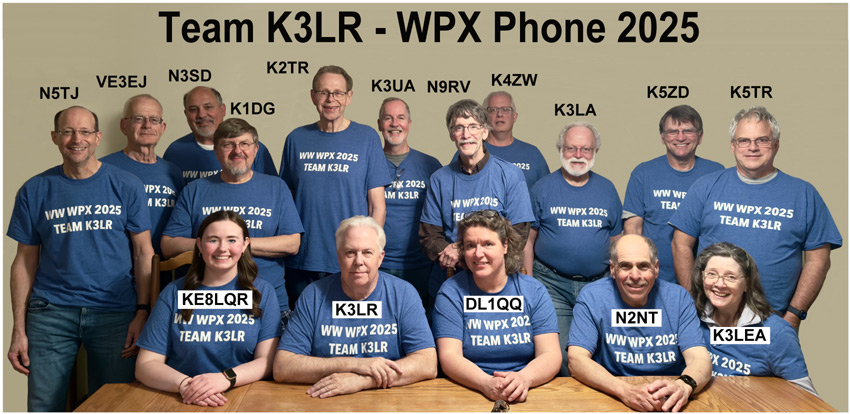In March 2025, I had the opportunity to join the K3LR team for the CQ WPX SSB Contest. It was truly a phenomenal experience. While I primarily operated on 80 meters, I had a few runs on 10, 15, 20 and 40 meters as well when the main operators for those bands took a break or slept.

The CQ WPX SSB was the second multi-op effort at K3LR that I had the chance to be a part of, the first being the CQ WW SSB in October 2024. While my experiences during each of the contests were distinctly different, a number of things remained the same, including the camaraderie and high enthusiasm among team members that was infectious for all of us.
Contesting is very much a mental challenge more than anything else, although there are other crucial elements to a successful contest team or station, such as the equipment (particularly antennas), the fine tuning of the station, the tactics and “plays” (so to speak) being used to make specific contacts, and the overall skill of the operators on the team. The most challenging part of contesting (for a beginning contester, at least) is the mental game of it. Having an enthusiastic team that can make jokes and have fun with each other is imperative to having a successful contest team.
Speaking of the “plays” and strategies used in a contest, this year was the first time there had been a multi-op effort for the CQ WPX SSB at K3LR. Usually this remains an off weekend, but this year after being challenged by ND7K, a team was quickly assembled to operate at K3LR. All showed up ready to jump into the experiences and learning curve that operating in a new contest would present.

Contesting is a great way to learn more about the technical and scientific aspects of amateur radio. You’re essentially collecting data about how your radios and antennas work at different times of the day and then analyzing that data to optimize your performance in the next contest.
To prepare for a contest, operators at K3LR typically study logs from the same contest in previous years. However, this contest posed an interesting quandary: Since it was the first year that a multi-multi team had done this contest from K3LR, there were no past logs to look at. We overcame this struggle by synthesizing the “data” that could be derived from the logs of other successful past entries in the CQ WPX SSB as well as the K3LR log from the recent ARRL DX Contest. While neither of these sources would perfectly indicate how propagation would pan out throughout the course of the weekend—due to variables such as being at different spots in the solar cycle, different times of the year, etc.—they could (and did) provide a fairly accurate prediction of how propagation would be for the weekend.
With tactics and intricacies like these, getting involved in contesting can be quite challenging because there’s so much to learn. It’s safe to say that even the most experienced contesters can still learn something new every time they operate in another contest.
Another consistency between the multi-multi teams that I have operated with at K3LR is their willingness to Elmer me and share their contesting knowledge. They were eager to answer any questions that I had (as well as some that I didn’t even know I had) and help me put their advice to use on the air.
For example, in the CQ WPX SSB, I was focused on making sure that my accuracy in copying the call signs and exchanges was good. Some of the other operators on the team assisted me with this goal by showing me specific settings to change on the radios to make the other stations easier to hear. They also taught me where the best places to point the antennas would be, and at what times, in order to diversify the number of prefixes we were able to make contact with.
Overall, the CQ WPX SSB experience was a major success for achieving my personal goals of improving specific contesting skills as well as the team’s goals. We all had a great time and left with countless memories and new insights into how to do well in the CQ WPX SSB. The experience was invigorating and made me excited to share some of the new things I had learned with the kids at my school’s amateur radio club.
The post Youth Ham Radio Insights: What It’s Like Being Part of a Contesting Team at the K3LR Superstation appeared first on OnAllBands.

